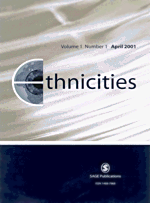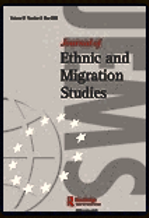In the absence of a historical subject of social change the meaning of change is transformed such that both Left and Right become the ambassadors of End of History thought.
Christopher Kyriakides
Selected Papers
Below you will find abstracts from a selection of my published peer-reviewed papers. To read the full paper click download.
Redressing Racism,
Communicating Citizenship:
State Legitimation Techniques in the Multicultural Metropolis.
The European Journal of Cultural & Political Sociology
Apolitical social marketing communications, however intendedly neutral, acquire political capabilities when metropolitan states in search of legitimacy use them to market multiculturalism. European metropoles are under pressure to reconcile their colonial histories with the contemporary need to engage minority ethnic citizens. Yet, in the communication of cultural belonging, antiracist state redress must also enlist the consent of majority ethnic citizens. Official antiracism defines ‘racism’ according to this dual need. Our focus is One Scotland, Many Cultures - the devolved Scottish polity’s ₤1-million antiracist social marketing campaign launched in 2002 under the Blair government’s UK-wide race strategy. Interviews with key actors responsible for its production, and content analysis of campaign advertisements, reveal that official antiracism attempts to engage disaffected multiethnic constituencies. The proposed political sociology of ethnicity and communication which informs this analysis alerts us to a significant and salient feature of metropolitan state legitimation – affective multiethnic governance.

'Other Than Mexicans,' 'Islamic Fascists' & the Transatlantic Regulation of Risky Subjects. Ethnicities
Post-9/11 significations of ‘immigration threat’ link the policing of the US-Mexico border to the ‘war on terror’ geo-politically such that domestic policies and practices related to the regulation of ‘undocumented’ Latino migrants shape and are shaped by extra-domestic considerations related to the signification of Arab and Muslim communities. In broadening migration analysis to include a geopolitical dimension we are able to draw out the changing patterns of racialized population regulation within a given territory of the international state complex. Consequently, extending the geopolitical reach to include US and UK post-9/11 security regimes reveals that the logic underpinning the ‘Other Than Mexican’ (OTM) immigration category in the US, ostensibly an addition to and extension of the signification of threat posed by Latinos to the US, is neither Latino nor US-specific: it mobilizes an idiom of threat around ‘special interest aliens’ as perpetrators of risk to the global social order, which broadens the domestic reach of state surveillance. The ‘war on terror’ with related discourses of ‘anti-fundamentalism’ and ‘islamofascism’ specifies that ‘risk averse’ surveillance ‘documents’ the ‘elusive undocumented’ carrier of terror threat, guilty by ‘association’: a cipher of fear is armed and disarmed, used to legitimate and operationalize surveillance as precautionary intervention. Through an analysis of the signification of immigration threat related to the state of Arizona’s“Support Our Law Enforcement and Safe Neighborhoods Act, SB1070”in 2010 with the judicial investigation surrounding the killing of Brazilian migrant Jean Charles de Menezes by Metropolitan police on the London Underground in 2005, this study reveals how the lethal logic of OTM regulation underpins the post-9/11 transatlantic politics of racialized risk, reconfiguring state intervention related to the ‘browning of America’ through an ‘anti-fundamentalist’ population control measure.
"Class & Race" -
Wiley-Blackwell Encyclopedia of Race, Ethnicity & Nationalism
This entry includes a political and theoretical conceptualization derived from twentieth century Marxist and black radical responses to labor movement complicity in the tenets and legacies of African slave labor, imperialism and nineteenth century scientific racism. Black radicals have attempted to retain a transformative critique of capitalism while questioning “white left” centering of an industrial proletarian class. While differing from stratification approaches which emphasize interplay between race relations and class inequalities, there is considerable overlap in the conceptualization of race as a status category. Both radical critique and stratification theory also influence contemporary identity politics where the concept of intersectionality assumes a central role over any one category of oppression such as race, gender, class, ability, national origin and sexual orientation. Class/race duality is de-emphasized in favor of a critical approach to multi-dimensional oppressions indicative of a hierarchical culture of “white” wealth, power and privilege.
The Allure of Race
From New Lefts to New Times
New Political Science
This article examines conceptual obstacles to emancipation which have emerged historically within Left theory on both sides of the Atlantic, concerned primarily with “class versus race” debates spanning from the post-war Hegelian moment to the post-structural present. While the “cultural turn” promised to give voice against structuralist silencing, the critical subject of emancipation has been defaced, eradicated such that we currently have no theoretical place from where to build an emancipatory project. We must clear an analytical space through which a renewed subject of liberation can be founded. In drawing out theoretical continuity and change across varied temporal and spatial locations—Fanon/Sartre and the French-Algerian encounter; Gilroy/Miles and British urban unrest—the article explores how the Left imaginary has lost its theoretical integrity, especially in its Foucauldian gaze, and is currently unable to provide a robust vision, beyond self-other interplay, of emancipatory change.

Post-Racial Pessimism
Therapolitics and the Anti-Utopian Present
darkmatter
‘Post-raciality’ encompasses seemingly antithetical positions: victory or utopia. However, one could argue that both are constitutive of a moment missed, the moment being that which comes after the ‘end of history’. An understanding of the post-racial requires that ‘it’ be situated within the paradigms which rejected ‘the conservatism of Left or Right’ and which branded the present as one of ‘no alternatives’, and consequently for many offered ‘no future’. Understood thus, the post-racial becomes an anti-utopian tool which validates the absence of alternative or big ‘P’ politics. Political elites aim to make us feel better about ourselves in the absence of solution. This is no cynical ruse; post-raciality is not a neo-liberal construct. Rather, post-racial pessimism is the logical outcome of the collapse of the emancipatory politics which defied modern oppression. This paper offers a meta-analysis of post-raciality and argues that therapolitics presents us with a line of continuity predicated on ‘safety’ and ‘trust’ which connects Clinton’s One America initiative, the establishment of the Other Than Mexican migrant category under the Bush administration, and Obama’s response to immigration and ‘hate’.
Racism, Muslims and the National Imagination
Ethnic & Migration Studies
This qualitative study investigates the relationship between racism and nationalism in two multi-ethnic British neighbourhoods, focusing specifically on the construction of ‘the Muslim’ as a racialised role sign. Through in-depth interviews with 102 ‘white’ and ‘non-white’ participants in Glasgow (Scotland) and Bristol (England) we investigate the extent to which ‘the Muslim’ is being demonised as an oppositional identity in the construction of English and Scottish codes of cultural belonging. We find that whilst Scottishness and Englishness draw on historically founded racialised (e.g. biological, phenotypical) referents of ‘whiteness’ at the level of the ‘multi-ethnic’ neighbourhood, such racialised codes of belonging are undermined in everyday life by hybridised codes: signifiers such as accent, dress, mannerisms and behaviours which destabilise phenotype as a concrete signifier of national belonging. However, those signifiers that contest the racialised referent are themselves reconfigured, such that contemporary signifiers of cultural values (e.g. terrorist, extremist) reinforce, but not completely, the original racialised referent. We conclude that a negative view of ‘the Muslim’ as antithetical to imagined racialised conceptions of nationhood cannot easily be sustained in the Scottish and English ‘multi-ethnic’ neighbourhood. The sign ‘Muslim’ is split such that contemporary significations perpetuate the exclusion of the ‘unhybridised foreign Muslim’.
Third Way Anti-Racism
Ethnic & Racial Studies
Recent debate surrounding racism and immigration in the UK reveals that anti-racist policy is being constructed within a ‘Third Way’ political agenda such that the definition of racism comes to signify a phenomenon considered detrimental to the ‘building of community’. Given the controversial role of the British state in perpetuating the ‘immigration/race-relations problematic’, this paper argues that New Labour’s approach to racism comes to embody a set of contradictory assumptions fostered in previous administrations while incorporating elements significant to ‘Third Way’ governance. Crucial to current policy prescription is the reconstitution of the subject of racism, such that both perpetrator and target are viewed through the policy lens of emotional governance. In short, the contemporary anti-racist state seeks to foster legitimacy via an appeal to an emotionalized subjective condition, so that policy defines racism according to the needs of state. Consequently, current ‘race-relations’ policy is an intervention which redefines racist causation while reinforcing state authority.
Migrant Labour, Racism and the British National Health Service
Ethnicity & Health
This study explores the dynamics of racism, specifically its generation and reproduction as an ideology, and its role in affecting the reception and occupational location of migrant medical labour in Britain. It is argued that the treatment of ‘overseas doctors’in Britain draws on a complex interplay between racism and nationalism underpinned by the historical construction of ‘welfarism’ as a moral legitimator of ‘Britishness’. Through an exploration of internal and external immigration controls introduced with the aim of regulating migrant labour, we demonstrate how British social policy and elite discourses of ‘race’ combine to construct moral prescriptions of threat such that migrants and British-born ‘non-whites’ entering the British medical profession are forced to negotiate ‘saviour/pariah’ ascriptions indicative of discriminatory but contradictory processes specific to the operation of the British National Health Service as a normative institution.
Codes of Cultural Belonging
Racialised National Identities in a Scottish Multiethnic Neighbourhood
Sociological Research Online
This qualitative study investigates the relationship between race and nation in an ethnically mixed neighbourhood in Glasgow, Scotland. It finds that Scottishness has a historically founded racialised referent at the level of the neighbourhood but that this referent is undermined in everyday life by syncretic codes of cultural belonging represented by signifiers such as accent, dress and mannerisms. However, these cultural signifiers that contest the racialised referent are, on occasions, themselves challenged by negative ascriptions such as terrorist and extremist which reinforce, though never completely, the original racialised referent of Scottishness as whiteness. We conclude that whiteness is an unstable identifier of Scottishness, and Scottishness is an unstable identifier of whiteness, such that a negative view of Islam as antithetical to imagined conceptions of Scottishness, cannot easily be sustained in areas of relatively high racialised minority settlement.







